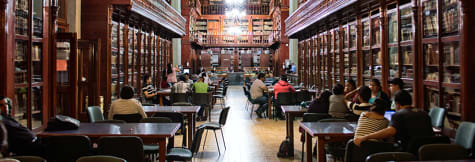It may not surprise you to learn that the world's most popular tourist destination is also one of the most popular countries for postgraduate study abroad.
In fact, the two compliment each other perfectly: as a Masters student living in France you'll have plenty of time to explore famous French cities along with their museums, art galleries and historic buildings.
And yes, you'll also have time to make the most of the other things that have made France famous – including its world-renowned cuisine and wine!
On this page you can read all about student life (la vie étudiante) in France, including advice on accommodation, living costs and working as a Masters student in France.
You can also read our separate guides to studying a Masters in France, language tests and French postgraduate fees and funding. Or, if you'd just like to start looking for your ideal French Masters degree, you can use our course search.
What's it like to study abroad in France?
Over 80 million international tourists can't be wrong – and neither can 250,000 international students: France is a top international leisure and study destination for a reason.
A history of accepting foreign visitors and students also means that French university cities (and their residents) will be happy to provide a helping hand as you settle into your new home away from home.
Once you've done so you'll find that life in France is not remarkably different to other parts of the western world; slightly more relaxed, perhaps, with a tendency to take time over the good things in life, but welcoming towards foreign visitors (particularly if you put in the time to learn a little of the language).
Food and drink
The French statesman Talleyrand is famous for remarking that
'England has three sauces and three hundred and sixty religions, whereas France has three religions and three hundred and sixty sauces'.
We're not sure that an association between sauce and religion is the most helpful way to approach postgraduate study in France (unless you're studying a joint Masters in Theology and Food Science, perhaps*) but it's certainly true that France takes food and drink seriously. And when in Rome... or Paris. You get the picture.
The full scope of French dining and cuisine needs no introduction here (and we wouldn't be able to fit it in anyway). Suffice to say that it's a lot like the food you may have eaten elsewhere in Europe... just better.
And better doesn't have to mean more complicated or expensive. In fact, the home of
haute cuisine
is actually one of the easiest places to eat well on a budget.
Even the largest French supermarkets will include well stocked butchers, bakers, greengrocers and fishmongers, with produce sourced locally or prepared on site. And if you like your cheese and wine (who doesn't?) you'll want to take a deep breath (and maybe pack a folding chair) before your first grocery shop.
The only downside to French food and drink (if there is one) is that some international dishes can be a little harder to come by.
Indian and Chinese restaurants are only just becoming established in France (as are takeaways in general). Some 'staple' student foods such as tinned beans, factory processed cheese and cheap sandwich bread are also a little less common.
Nevermind. You'll just have to eat better for the same price.
*By the way, we've checked our course database: there aren't any joint Masters degrees in Theology and Food Science... yet.
Student societies and social life
French university towns and cities are home to many sports groups and student associations. Not all of them are formally run by universities themselves but activities should be available to suit all interests: including cultural, sporting, scientific, artistic or volunteering activities.
Needless to say, groups are a great way to meet other students at the beginning of your Masters degree – and to maintain leisure activities as a means of relaxation later on.
Students also benefit from discounted entry to many cultural and artistic venues and establishments (as well as some restaurants and eateries).
Student parties (or soirées étudiantes) are a real institution in France. Whether they involve a small gathering in someone's flat, or a larger excursion to a pub or club, these are another great way to meet other postgraduates and socialise outside of your degree work.
Alcohol is likely to be served but the drinking culture in France is quite relaxed. Student parties are as likely to be focussed on conversation, music and dancing as they are on drinking. In general, having wine with your meal is perfectly acceptable, but drunken and disorderly behaviour is uncommon – and frowned upon.
Shopping
Large French cities are unrivalled when it comes to luxury retailing, including fashion shops, boutiques and jewellery stores.
If you prefer a more rustic approach you'll find that markets are common in most smaller towns and communities, with stalls selling clothing and consumer goods as well as locally produced food and drink.
By law, all shops, restaurants and cultural institutions must close one day a week. This is most often on a Sunday (except for bakeries which tend to close on a Monday).
There are also numerous bank holidays in France and if these fall on a Thursday or Tuesday, it is quite common for many organisations to 'do the bridge' (faire le pont') and close from Thursday to Sunday or Saturday to Tuesday, respectively. Bear this in mind when shopping in France - or making plans to use banking and transport services.
Search for a Masters in France
Ready to start looking for your ideal study abroad opportunity? Browse and compare Masters degrees in France on FindAMasters.com
Accommodation
Finding accommodation to study abroad can be tricky without the ability to view properties or discuss lease arrangements in person and France is no different. However, international students in France
can
be eligible for support with accommodation costs.
There are three main types of accommodation available to you as a Masters student in France: public student residences (Cités-U), independent other (independent) university residences and privately rented accommodation.
Public student residences
Cités-U
Accommodation at French public universities is centrally managed by the
Centre Régional des Oeuvres Universitaires et Scolaires
(CROUS). These halls of residence are referred to as
Cités-U.
They can be located on university campuses, or in suitable facilities in nearby towns and cities.
The price of accommodation managed by CROUS is very affordable, with the average monthly rent currently €350 (€525 in Paris).
However, the availability of this housing is limited and preference is normally given to students who are receiving support from the French government (you can read more about public bursaries in our guide to French Masters funding).
Some rooms may also be reserved for overseas students, or even specifically put aside for international postgraduates.
Applications for CROUS /
Cités-U
accommodation can should be made between January 15th and April 30th (in the academic year prior to the beginning of your Masters). You can apply via the official French study portal, or with the assistance of your university.
Other university accommodation
CROUS isn't the only provider of student accommodation in France. Some institutions manage their own separate accommodation and make this available to students according to their own criteria.
In particular,
Grandes Écoles
and private universities often have rooms available specifically for international students. The cost of these obviously varies by institution, but you should expect to pay something in the region of €250-350 per month.
Private rentals
If university accommodation isn't available to you (via CROUS or privately) you can search for a private rental. Most university towns and cities will have a range of housing suitable for students – some accommodation will be specifically designed and set up for this purpose.
It can be difficult to assess and apply for accommodation from outside France, but you may find that your university maintains a list of approved local landlords.
Once you've gotten around the difficulty of selecting accommodation, you'll probably find that private rentals offer the most flexibility and the widest range of features. Housing will be available in a wide range of configurations, including single rooms, bedsits and shared flats.
Accommodation designed for students may include additional services such as canteens, shopping or even cleaning.
Prices will vary, but you can expect to pay more than you would for housing run by CROUS or by a university.
A private student rental will probably cost, on an average €490 in most cities (€900 in Paris).
An organisation called LoKaViZ maintains a database of suitable accommodation for registered students in France.
France is a good value study abroad destination, with low tuition fees and excellent quality food and drink at affordable prices.
The French government estimates that international students should have access to around €615 per month to cover maintenance and living costs.
This is the amount suggested as proof of financial resources for visa applications and is based on the support available via French government bursaries. Actual student living costs in France may be higher, depending on your accommodation arrangements and lifestyle (all that cheese and wine won't buy itself, after all).

 Continue with Facebook
Continue with Facebook






